General Sir John Monash, Personal Files Book 19, 4 June - 24 June 1918, Part 5
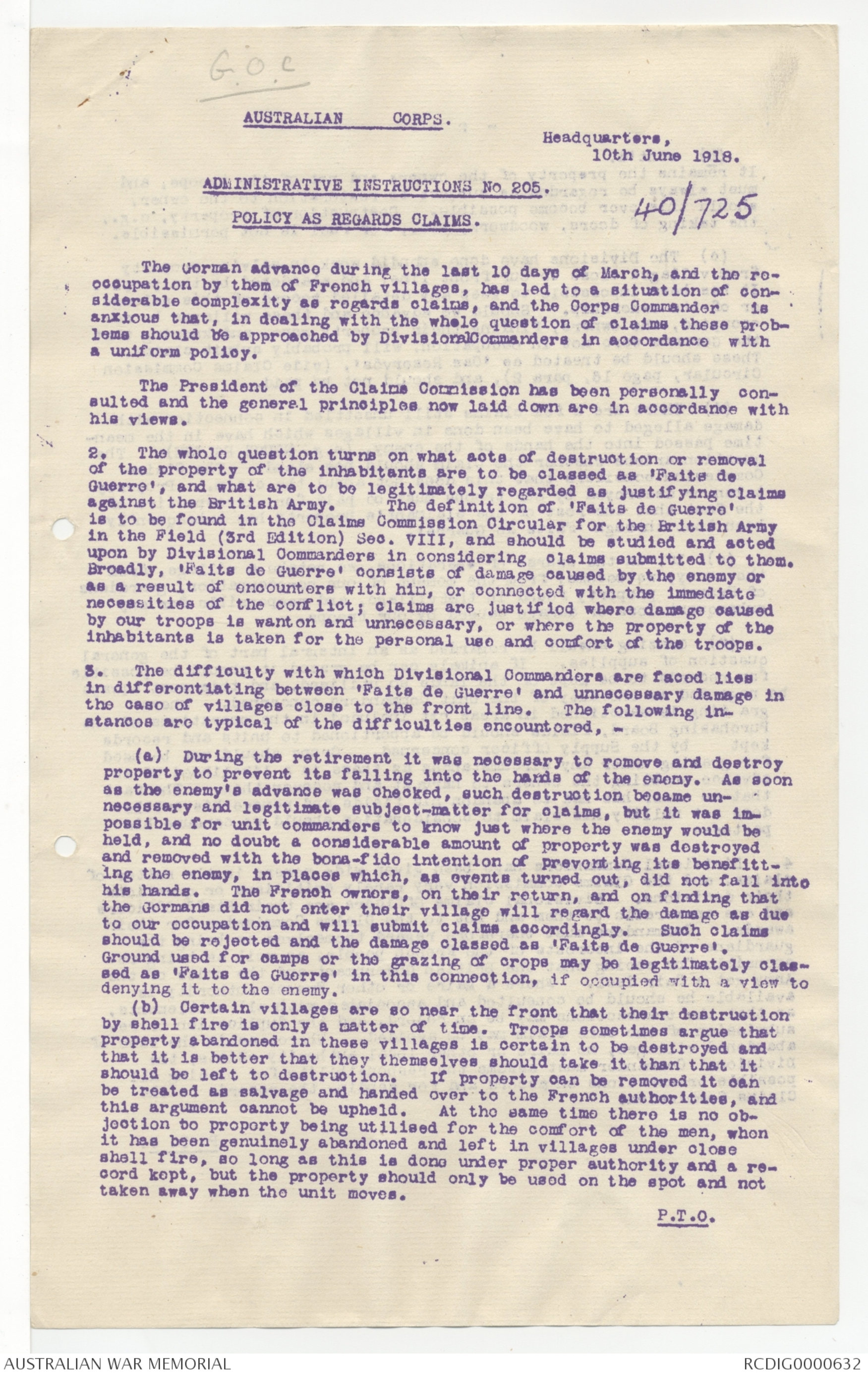
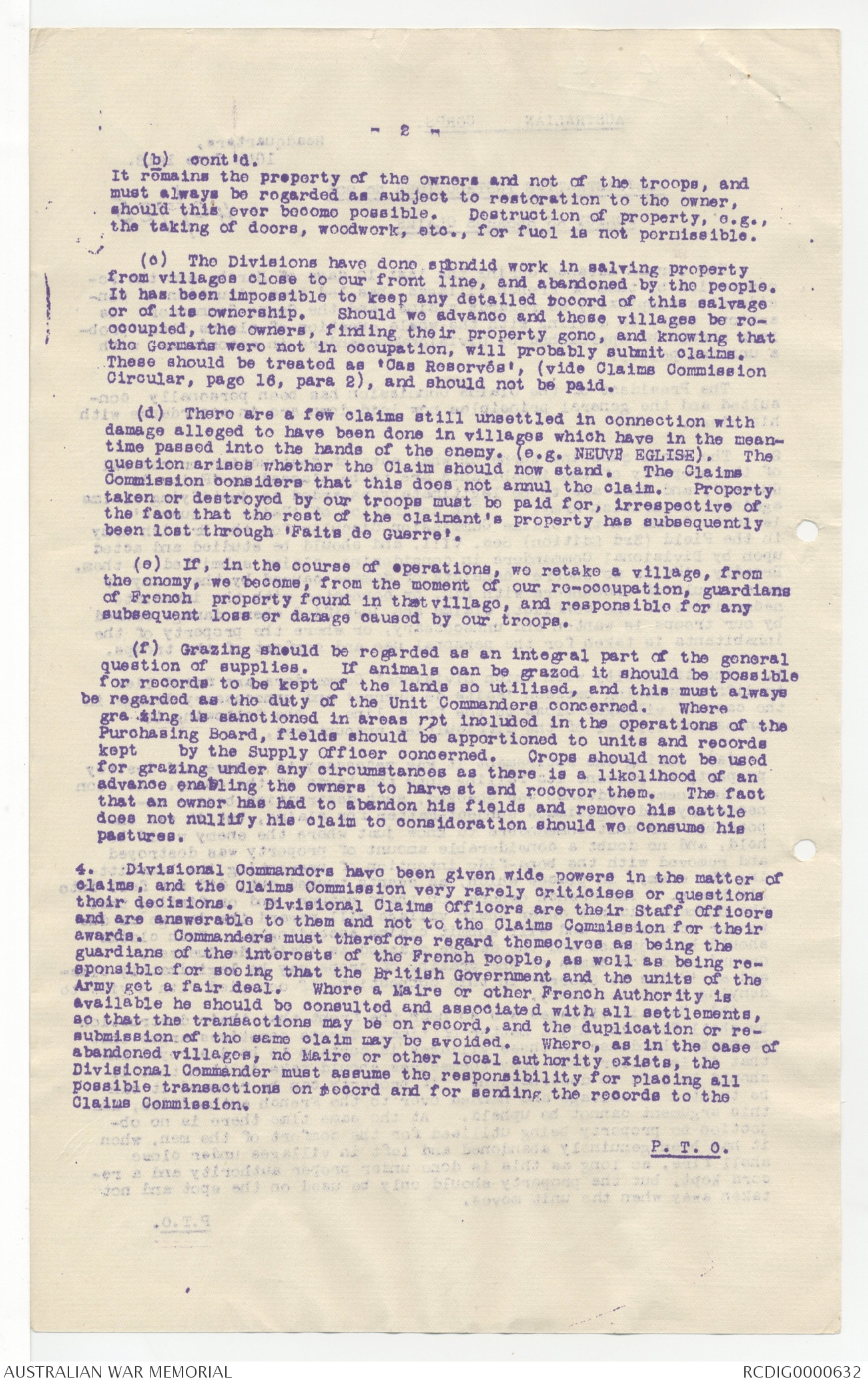
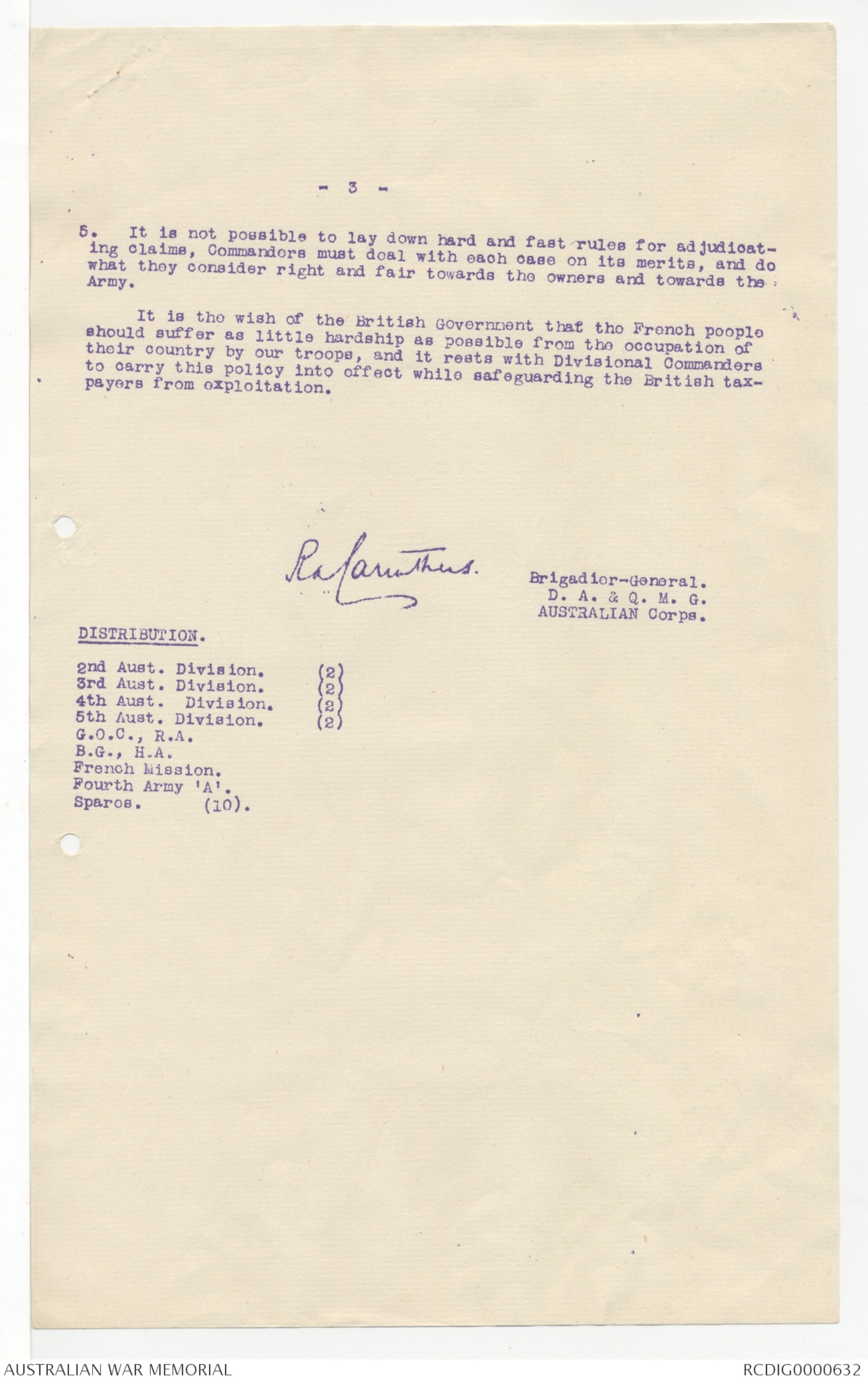
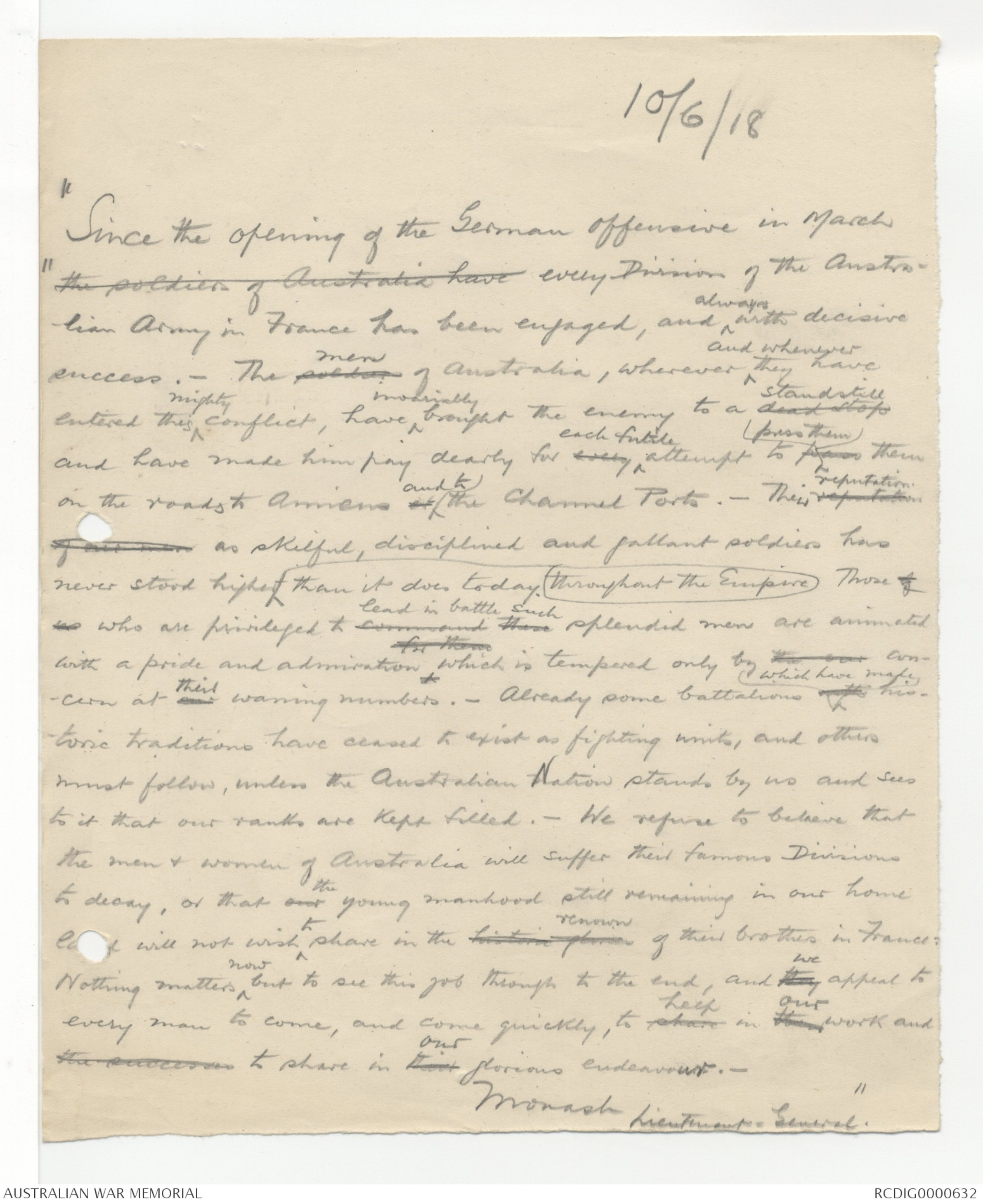
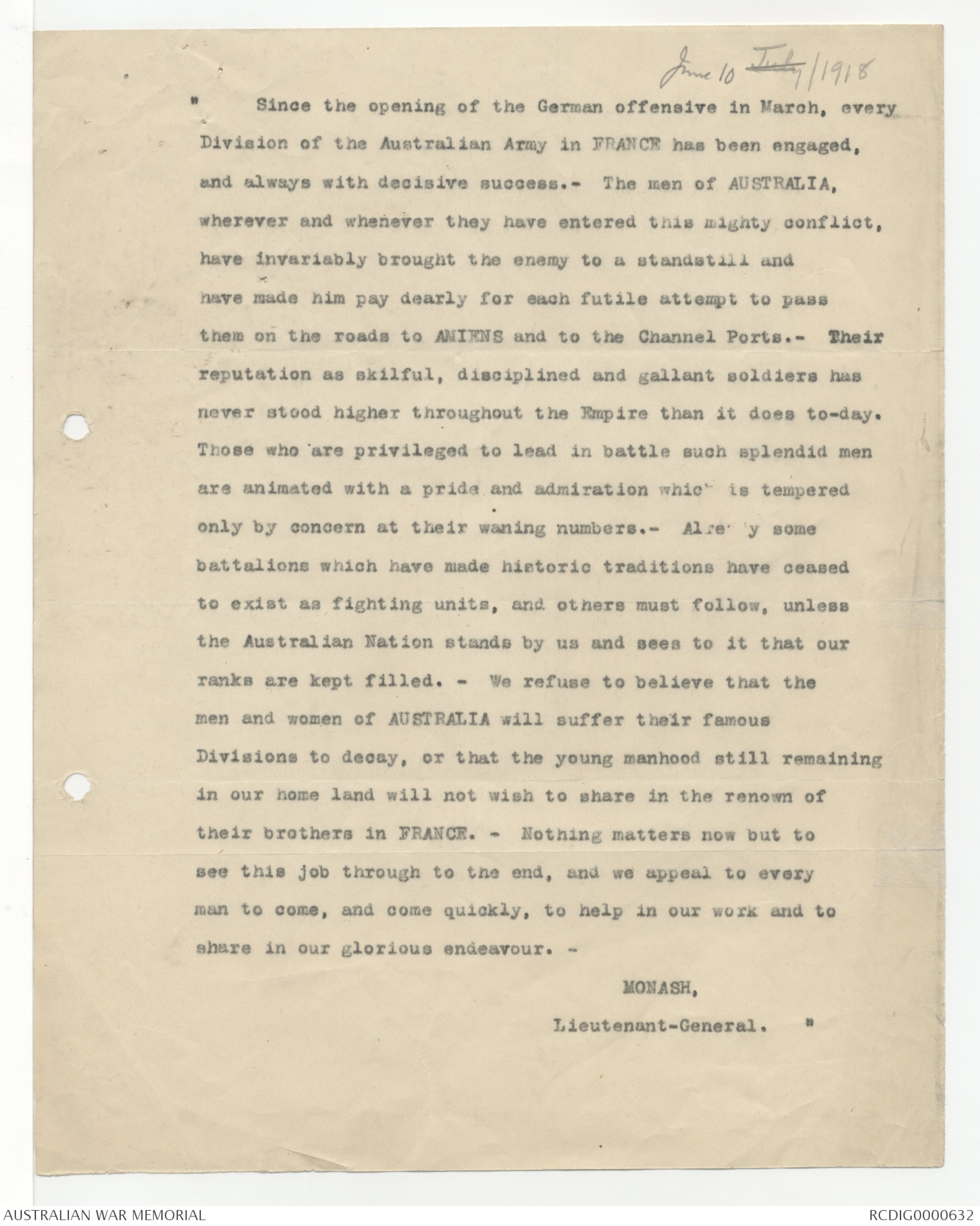
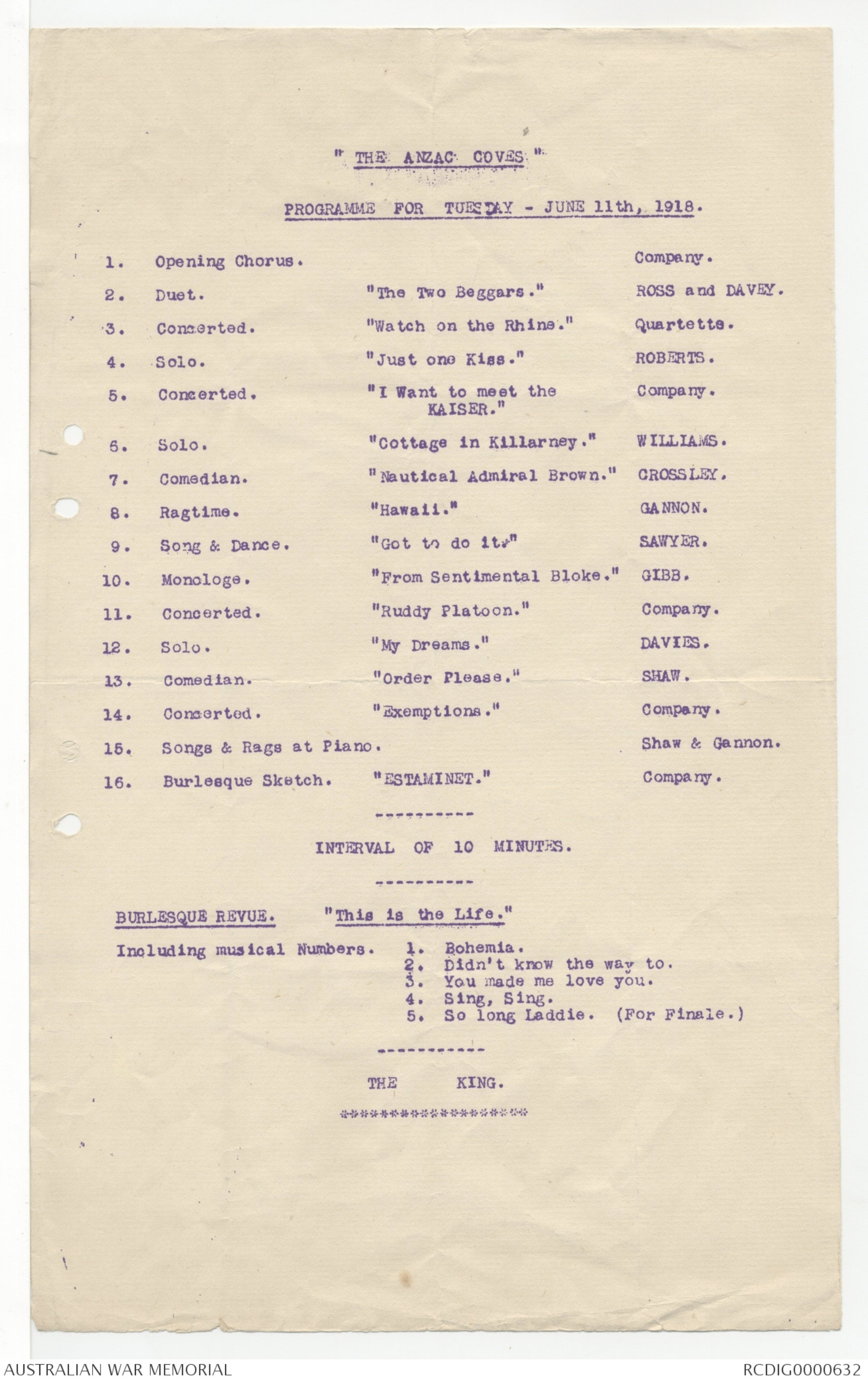
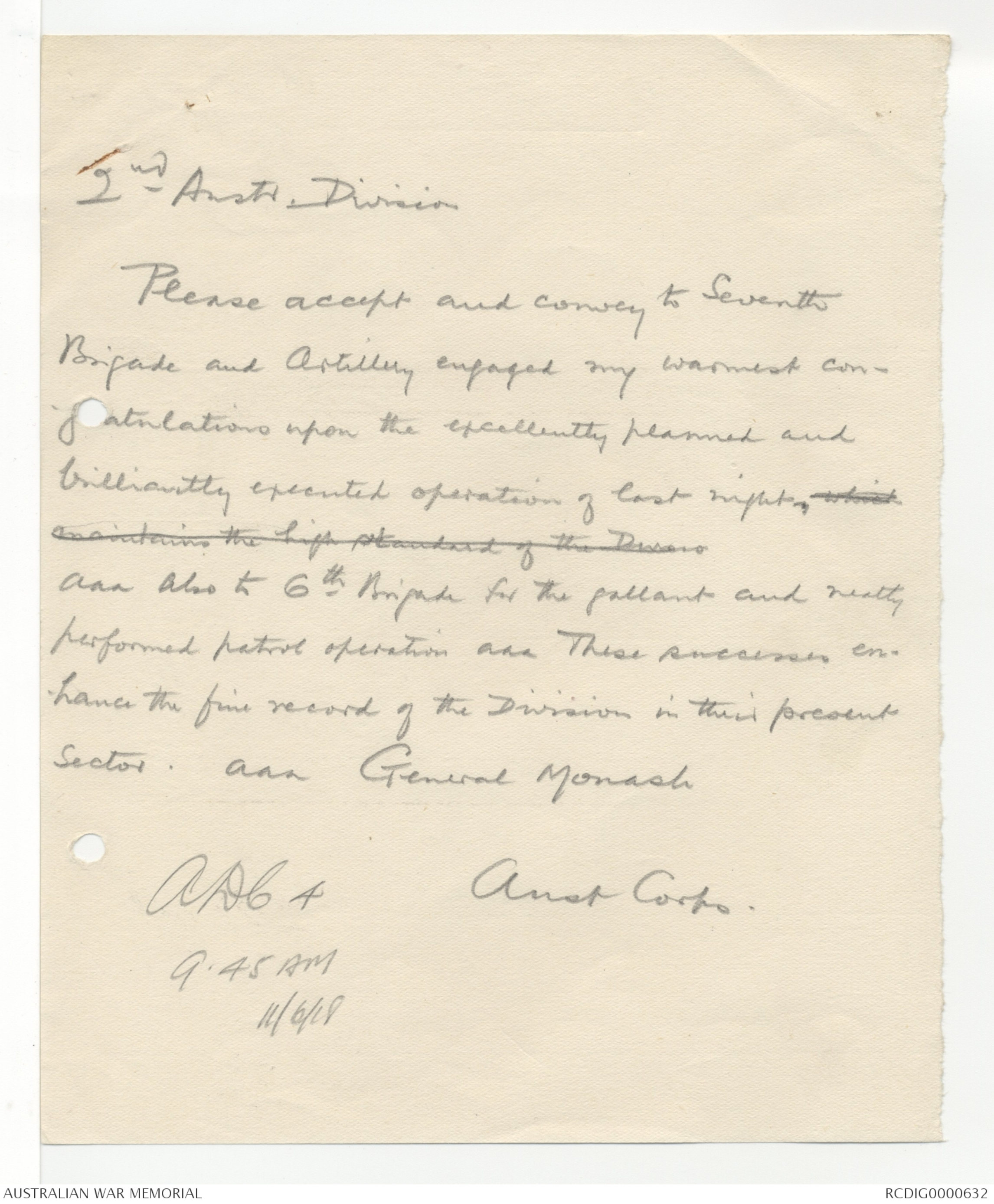
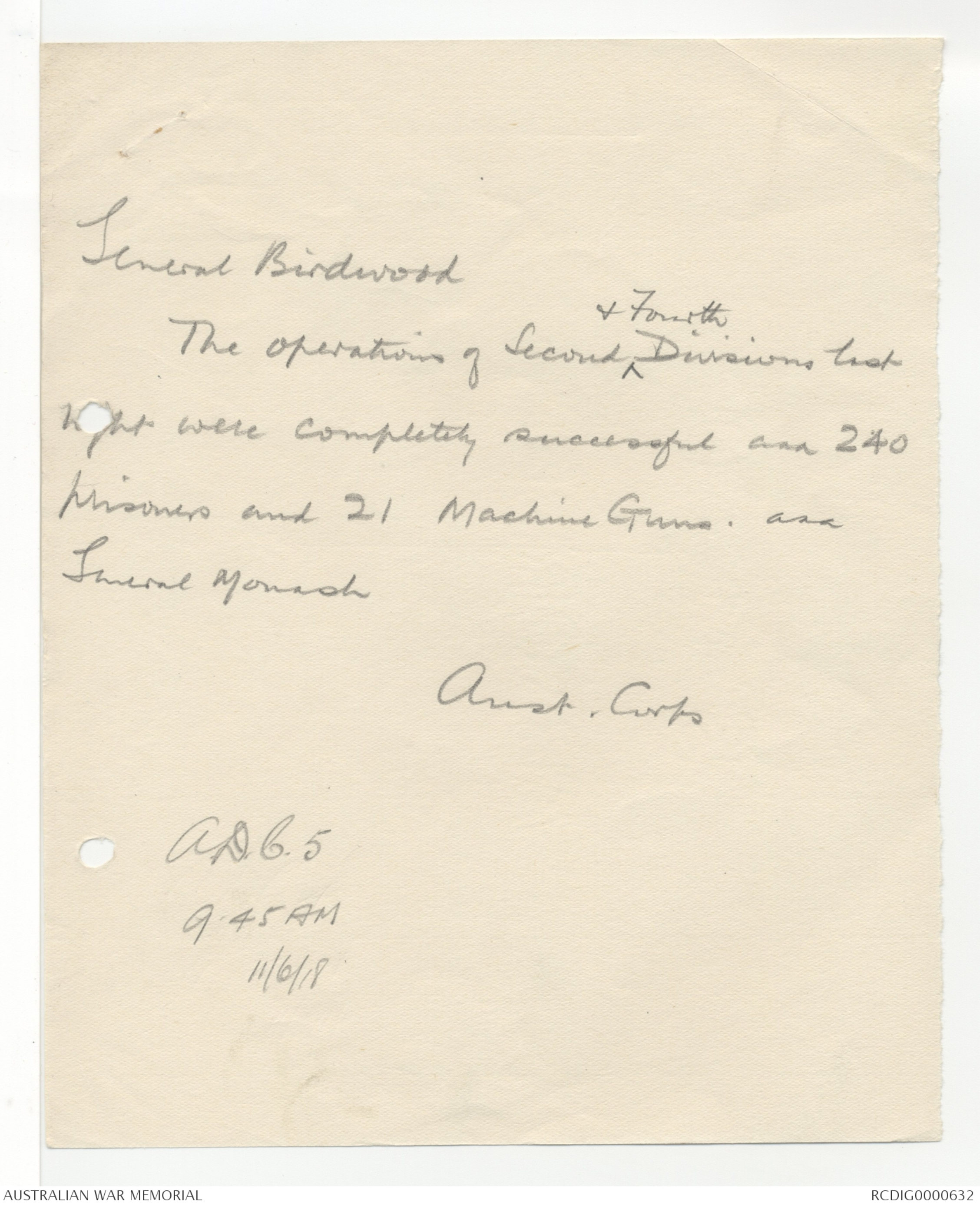
G.O.C
AUSTRALIAN CORPS.
Headquarters,
10th June 1918.
ADMINISTRATIVE INSTRUCTIONS No 205.
POLICY AS REGARDS CLAIMS.
[*40/725*]
The German advance during the last 10 days of March, and the reoccupation
by them of French villages, has led to a situation of considerable
complexity as regards claims, and the Corps Commander is
anxious that, in dealing with the whole question of claims these problems
should be approached by DivisionalCommanders in accordance with
a uniform policy.
The President of the Claims Commission has been personally consulted
and the general principles now laid down are in accordance with
his views.
2. The whole question turns on what acts of destruction or removal
of the property of the inhabitants are to be classed as 'Faits de
Guerre', and what are to be legitimately regarded as justifying claims
against the British Army. The definition of 'Faits de Guerre'
is to be found in the Claims Commission Circular for the British Army
in the Field (3rd Edition) Sec. VIII, and should be studied and acted
upon by Divisional Commanders in considering claims submitted to them.
Broadly, 'Faits de Guerre' consists of damage caused by the enemy or
as a result of encounters with him, or connected with the immediate
necessities of the conflict; claims are justified where damage caused
by our troops is wanton and unnecessary, or where the property of the
inhabitants is taken for the personal use and comfort of the troops.
3. The difficulty with which Divisional Commanders are faced lies
in differentiating between 'Faits de Guerre' and unnecessary damage in
the case of villages close to the front line. The following instances
are typical of the difficulties encountered, -
(a) During the retirement it was necessary to remove and destroy
property to prevent its falling into the hands of the enemy. As soon
as the enemy's advance was checked, such destruction became unnecessary
and legitimate subject-matter for claims, but it was impossible
for unit commanders to know just where the enemy would be
held, and no doubt a considerable amount of property was destroyed
and removed with the bona-fide intention of preventing its benefitting
the enemy, in places which, as events turned out, did not fall into
his hands. The French owners, on their return, and on finding that
the Germans did not enter their village will regard the damage as due
to our occupation and will submit claims accordingly. Such claims
should be rejected and the damage classed as 'Faits de Guerre'.
Ground used for camps or the grazing of crops may be legitimately classed
as 'Faits de Guerre' in this connection, if occupied with a view to
denying it to the enemy.
(b) Certain villages are so near the front that their destruction
by shell fire is only a matter of time. Troops sometimes argue that
property abandoned in these villages is certain to be destroyed and
that it is better that they themselves should take it than that it
should be left to destruction. If property can be removed it can
be treated as salvage and handed over to the French authorities, and
this argument cannot be upheld. At the same time there is no objection
to property being utilised for the comfort of the men, when
it has been genuinely abandoned and left in villages under close
shell fire, so long as this is done under proper authority and a record
kept, but the property should only be used on the spot and not
taken away when the unit moves.
P.T.O.
- 2 -
(b) cont'd.
It remains the property of the owners and not of the troops, and
must always be regarded as subject to restoration to the owner,
should this ever become possible. Destruction of property, e.g.,
the taking of doors, woodwork, etc., for fuel is not permissible.
(c) The Divisions have done splendid work in salving property
from villages close to our front line, and abandoned by the people.
It has been impossible to keep any detailed record of this salvage
or of its ownership. Should we advance and those villages be reoccupied,
the owners, finding their property gone, and knowing that
the Germans were not in occupation, will probably submit claims.
These should be treated as 'Cas Reservés', (vide Claims Commission
Circular, page 16, para 2), and should not be paid.
(d) There are a few claims still unsettled in connection with
damage alleged to have been done in villages which have in the meantime
passed into the hands of the enemy. (e.g. NEUVE EGLISE). The
question arises whether the Claim should now stand. The Claims
Commission considers that this does not annul the claim. Property
taken or destroyed by our troops must be paid for, irrespective of
the fact that the rest of the claimant's property has subsequently
been lost through 'Faits de Guerre'.
(e) If, in the course of operations, we retake a village, from
the enemy, we become, from the moment of our re-occupation, guardians
of French property found in that village, and responsible for any
subsequent loss or damage caused by our troops.
(f) Grazing should be regarded as an integral part of the general
question of supplies. If animals can be grazed it should be possible
for records to be kept of the lands so utilised, and this must always
be regarded as the duty of the Unit Commanders concerned. Where
grazing is sanctioned in areas not included in the operations of the
Purchasing Board, fields should be apportioned to unite and records
kept by the Supply Officer concerned. Crops should not be used
for grazing under any circumstances as there is a likelihood of an
advance enabling the owners to harvest and recover them. The fact
that an owner has had to abandon his fields and remove his cattle
does not nullify his claim to consideration should we consume his
pastures.
4. Divisional Commanders have been given wide powers in the matter of
claims, and the Claims Commission very rarely criticises or questions
their decisions. Divisional Claims Officers are their Staff Officers
and are answerable to them and not to the Claims Commission for their
awards. Commanders must therefore regard themselves as being the
guardians of the interests of the French people, as wells being responsible
for seeing that the British Government and the units of the
Army get a fair deal. Where a Maire or other French Authority is
available he should be consulted and associated with all settlements,
so that the transactions may be on record, and the duplication or resubmission
of the same claim may be avoided. Where, as in the case of
abandoned villages, no Maire or other local authority exists, the
Divisional Commander must assume the responsibility for placing all
possible transactions on record and for sending the records to the
Claims Commission.
P.T.0.
-3-
5. It is not possible to lay down hard and fast rules for adjudicating
claims, Commanders must deal with each case on its merits, and do
what they consider right and fair towards the owners and towards the
Army.
It is the wish of the British Government that the French people
should suffer as little hardship as possible from the occupation of
their country by our troops, and it rests with Divisional Commanders
to carry this policy into effect while safeguarding the British taxpayers
from exploitation.
RaCaruthers.
Brigadier-General.
D. A. & Q. M. G.
AUSTRALIAN Corps.
DISTRIBUTION.
2nd Aust. Division. (2)
3rd Aust. Division. (2)
4th Aust. Division. (2)
5th Aust. Division. (2)
G.O.C., R.A.
B.G., H.A.
French Mission.
Fourth Army 'A'.
Spares. (10).
10/6/18
"Since the opening of the German Offensive in March
"the soldiers of Australia have every Division of the Australian
Army in France has been engaged, and ∧always with decisive
success.- The population men of Australia, wherever ∧and whenever they have
entered this ∧mighty conflict, have ∧invariably brought the enemy to a dead stop standstill
and have made him pay dearly for every ∧each futile attempt to pass ∧pass them them
on the roads to Amiens at ∧and to the Channel Ports.- Their reportation reputationof our men as skilful, disciplined and gallant soldiers has
never stood higher ^throughout the Empire than it does today. Those ofus who are privileged to command them lead in battle such splendid men are animated
with a pride and admiration ^for them which is tempered only by the cor concern
at our their waning numbers.- Already some battalions with ^which have made historic
traditions have ceased to exist as fighting units, and others
must follow, unless the Australian Nation stands by us and sees
to it that our ranks are kept filled.- We refuse to believe that
the men & women of Australia will suffer their famous Divisions
to decay, or that our the young manhood still remaining in our home
land will not wish ∧to share in the historic glories renown of their brothers in France.-
Nothing matters ∧now but to see this job through to the end, and they we appeal to
every man to come, and come quickly, to share help in their our work andthe successes to share in their our glorious endeavour.-
Monash
Lieutenant-General."
June 10 July/1918
"Since the opening of the German offensive in March, every
Division of the Australian Army in FRANCE has been engaged,
and always with decisive success. - The men of AUSTRALIA,
wherever and whenever they have entered this mighty conflict,
have invariably brought the enemy to a standstill and
have made him pay dearly for each futile attempt to pass
them on the roads to AMIENS and to the Channel Ports.- Their
reputation as skilful, disciplined and gallant soldiers has
never stood higher throughout the Empire than it does to-day.
Those who are privileged to lead in battle such splendid men
are animated with a pride and admiration which is tempered
only by concern at their waning numbers.- Already some
battalions which have made historic traditions have ceased
to exist as fighting units, and others must follow, unless
the Australian Nation stands by us and sees to it that our
ranks are kept filled. - We refuse to believe that the
men and women of AUSTRALIA will suffer their famous
Divisions to decay, or that the young manhood still remaining
in our home land will not wish to share in the renown of
their brothers in FRANCE. - Nothing matters now but to
see this job through to the end, and we appeal to every
man to come, and come quickly, to help in our work and to
share in our glorious endeavour. -
MONASH,
Lieutenant-Ceneral. "
"THE ANZAC COVES"
PROGRAMME FOR TUESDAY - JUNE 11th, 1918.
| 1. | Opening Chorus. | Company. | |
| 2. | Duet. | "The Two Beggars." | ROSS and DAVEY. |
| 3. | Concerted. | "Watch on the Rhine." | Quartette. |
| 4. | Solo. | "Just one Kiss." | ROBERTS. |
|
5.
|
Concerted.
|
'I Want to meet the KAISER." |
Company.
|
| 6. | Solo. | "Cottage in Killarney." | WILLIAMS. |
| 7. | Comedian. | "Nautical Admiral Brown." | CROSSLEY. |
| 8. | Ragtime. | "Hawaii." | GANNON. |
| 9. | Song & Dance. | "Got to do it." | SAWYER. |
| 10. | Monologe. | "From Sentimental Bloke." | GIBB. |
| 11. | Concerted. | "Ruddy Platoon." | Company. |
| 12. | Solo. | "My Dreams." | DAVIES. |
| 13. | Comedian. | "Order Please." | SHAW. |
| 14. | Concerted. | "Exemptions." | Compeny. |
| 15. | Songs & Rags at Piano. | Shaw & Gannon. | |
| 16. | Burlesque Sketch. | "ESTAMINET." | Company. |
INTERVAL OF 10 MINUTES.
BURLESOUE REVUE. 'This is the Life."
Including musical Numbers. 1. Bohemia.
2. Didn't know the way to.
3. You made me love you.
4. Sing, Sing.
5. So long Laddie. (For Finale.)
THE KING.
2nd Austr. Division
Please accept and convey the Seventh
Brigade and Artillery engaged my warmest congratulations
upon the excellently planned and
brilliantly executed operation of last night, whichmaintains the high standard of the Divisio
and also to 6th Brigade for the gallant and neatly
performed patrol operations aaa These successes enhance
the fine record of the Division in their present
sector. aaa General Monash
Aust Corps.
ADC 4
9.45 AM
11/6/18
General Birdwood
The operation of Second ∧& Fourth Divisions last
night were completely successful aaa 240
prisoners and 21 machine Guns aaa
General Monash
Aust. Corps
ADC. 5
9.45 AM
11/6/18
 Daphne
DaphneThis transcription item is now locked to you for editing. To release the lock either Save your changes or Cancel.
This lock will be automatically released after 60 minutes of inactivity.